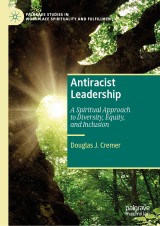Details
Antiracist Leadership
A Spiritual Approach to Diversity, Equity, and InclusionPalgrave Studies in Workplace Spirituality and Fulfillment
|
149,79 € |
|
| Verlag: | Palgrave Macmillan |
| Format: | |
| Veröffentl.: | 01.07.2024 |
| ISBN/EAN: | 9783031617287 |
| Sprache: | englisch |
| Anzahl Seiten: | 200 |
Dieses eBook enthält ein Wasserzeichen.
Beschreibungen
<p>This book presents a new vision and strategy for a spiritual antiracism that values diversity, equity, and inclusion. Employing the practice of seeing, choosing, and acting as a framework, it examines the role of Christian spirituality, which includes religious values, interpretations of scripture and tradition, and general concerns with the human soul. Christian spirituality was integral to developing and justifying an ideology of “white” supremacy and Christian spirituality has the potential for resisting and rejecting this same racism. Responding to the very idea of “race,” born from the ideology of racism and “white” supremacy, the author shows how to envision and implement a spiritual approach that respects both human dignity and individual distinctiveness. Understanding the fundamental value of human dignity as deeply rooted in the Christian tradition serves as one antidote for other readings of the tradition that can be used to justify oppression and segregation.</p>
<p>This book addresses those interested in leadership in challenging times buffeted by issues of racism, privilege, and power in our communities, workplaces, and lives. It will appeal to those who are seeking how to lead within the tensions of these times with fresh approaches to questions of diversity, equity, and inclusion.</p>
<p> </p>
<p>This book addresses those interested in leadership in challenging times buffeted by issues of racism, privilege, and power in our communities, workplaces, and lives. It will appeal to those who are seeking how to lead within the tensions of these times with fresh approaches to questions of diversity, equity, and inclusion.</p>
<p> </p>
<p>Chapter 1: Introduction.- Part I: Seeing.- Chapter 2: Struggling to Change: The Limits of Antiracist Leadership.- Chapter 3: Leadership in a Crisis: Racism as Existential Problem.- Part II: Choosing.- Chapter 4: A Spiritual Approach: Racism and Christianity.- Chapter 5: Resetting Expectations: An Appreciation of Darkness.- Part III: Acting.- Chapter 6: Embracing Conflict: Dealing with the Inevitable Tensions.- Chapter 7: Creating an Antiracist Organization: Leading through Reconciliation.- Chapter 8: Conclusion.</p>
<p><strong>Douglas J. Cremer</strong> is Professor of History and Interdisciplinary Studies at Woodbury University, USA. His research interests include contemporary theories of race, gender, political violence, and terrorism as well as modern Catholic and Christian theology and history.</p>
<p>This book presents a new vision and strategy for a spiritual antiracism that values diversity, equity, and inclusion. Employing the practice of seeing, choosing, and acting as a framework, it examines the role of Christian spirituality, which includes religious values, interpretations of scripture and tradition, and general concerns with the human soul. Christian spirituality was integral to developing and justifying an ideology of “white” supremacy and Christian spirituality has the potential for resisting and rejecting this same racism. Responding to the very idea of “race,” born from the ideology of racism and “white” supremacy, the author shows how to envision and implement a spiritual approach that respects both human dignity and individual distinctiveness. Understanding the fundamental value of human dignity as deeply rooted in the Christian tradition serves as one antidote for other readings of the tradition that can be used to justify oppression and segregation.</p>
<p>This book addresses those interested in leadership in challenging times buffeted by issues of racism, privilege, and power in our communities, workplaces, and lives. It will appeal to those who are seeking how to lead within the tensions of these times with fresh approaches to questions of diversity, equity, and inclusion.</p>
<p><strong>Douglas J. Cremer</strong> is Professor of History and Interdisciplinary Studies at Woodbury University, USA. His research interests include contemporary theories of race, gender, political violence, and terrorism as well as modern Catholic and Christian theology and history.</p>
<p>This book addresses those interested in leadership in challenging times buffeted by issues of racism, privilege, and power in our communities, workplaces, and lives. It will appeal to those who are seeking how to lead within the tensions of these times with fresh approaches to questions of diversity, equity, and inclusion.</p>
<p><strong>Douglas J. Cremer</strong> is Professor of History and Interdisciplinary Studies at Woodbury University, USA. His research interests include contemporary theories of race, gender, political violence, and terrorism as well as modern Catholic and Christian theology and history.</p>
Develops a spiritual approach rooted in appreciation for difference and an embrace of tensions as necessary actions Proposes that the Christian spiritual tradition is both one of the cause and the solutions for overcoming racism Highlights the inherent contradictions and tensions that are inevitable conditions of working in complex organizations
Diese Produkte könnten Sie auch interessieren:

Vergleich von zwei empirischen Studien. Homeoffice und duales Studium als Zukunftstrends der Arbeitswelt

von: Maksim Khazanov

13,99 €

Spikermaniya. Govori, ubezhday, vliyay. Pervoe poshagovoe rukovodstvo professionalnogo spikera

von: Tatyana Vinokurova, Olga Dianova

10,49 €















